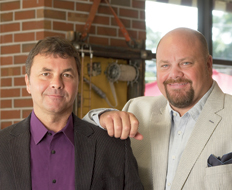The past few years have not been the kindest to the $660.5 billion restaurant industry. Faced with frugal consumers, scarce credit, and rising food prices, operators suffered through lower sales and tighter margins.
Adding to the pressure was last summer’s drought (the largest in the U.S. since the 1950s), which spiked the cost of meat and dairy products and will likely increase food prices between 3 and 4 percent, according to the USDA. These challenges have applied more pressure on companies already struggling to get back in the black.
But not Firehouse Subs. Last year, the fast-casual sub sandwich franchise clocked in a record year in sales, bringing in $385 million in revenue in its 589 restaurants spread across 35 states and Puerto Rico. And for the last two years, Franchise Business Review has ranked the company tops in franchisee satisfaction.
Robin Sorensen, cofounder of Firehouse Subs, says the business’s frugality has been key to its success. The company has been debt-free since 2001, an uncommon practice at a time when the economy is in shambles.
“The funny thing is, I was the furthest from frugal before we started Firehouse Subs,” Sorensen says. “The magnitude of signing the lease, creation of Firehouse Subs, and buying the food and equipment really helped to tighten our wallet.”
Eighteen years after opening their first Firehouse Subs restaurant in Jacksonville, Florida, Sorensen and his brother, cofounder Chris Sorensen, say the decision to be debt free wasn’t just on a whim. Rather, it was the end result of their commitment to build a brand, not their personal lifestyles.
“Chris and I drew a minimal salary and didn’t take a distribution of profits until the day of our 10-year anniversary,” Sorensen says. “Investing in the infrastructure and building the business yielded zero debt. We didn’t focus on it; it happened organically.”
The advantages of debt-free
Christopher Wells, founder of Restaurant Building Blocks, a company that specializes in restaurant management and training to help owners and operators maximize profits, believes that one of the advantages of being debt-free is you’re not dependent on the economy.
“If you incur some debt and then the economy takes a turn for the worse and your sales are down from the previous year, you could be facing some hard decisions if you are not able to repay that debt,” he says. “Also, some of the capital you need to help your brand might be going toward interest and fees—not an attractive situation if you are in a make-or-break situation.”
Firehouse Subs’ ability to prosper while the economy tanked can largely be credited to the tight grip the Sorensen brothers maintain on the company’s strategy and vision. Being debt-free helped tremendously when the company experienced a downturn in sales in 2008 and 2009.
“Because we had a cash surplus and no debt, we didn’t make any kneejerk decisions and we weren’t in a position where our personal lifestyle was driving decisions at the office,” Sorensen says. “We were able to sit back, take our time, and make good decisions on how to turn the ship around.”
Wells says that without debt, all the capital can be put into growing the business, a strategic decision the Sorensens made when the company started turning a profit. Once they paid off their initial debt, Sorensen says they accumulated cash and then reinvested their profits back into the business by lending it to franchisees, a practice they still do to this day.
“Along with our franchisees, we’ve invested millions of dollars of our own money in our marketing campaigns,” Sorensen says. “It’s worked wonderfully and serves as another example of how important it is to put your business first.”
Firehouse Subs estimates opening around 400–500 new franchises in the coming years, with an ultimate goal of 2,000 restaurants by 2020. Wells says it makes sense for a company at that stage to remain debt free.
“The infrastructure to attract franchisees, train them, and support them in opening their restaurant is well in place,” he says. “Their numbers are a great sign of a positive investment opportunity for someone looking at dropping a few hundred thousand [dollars] in a brand that is debt free and that has the infrastructure and the objective to grow by 70 percent in the next decade.”
[pagebreak]
Bad debt vs. good debt
Not all debt is bad debt. Wells says operators should consider accruing debt if they encounter it at the right time and for the right reasons. He says it shouldn’t be something that gets you out of a slump or acquires fancy gadgets the business doesn’t need, but rather something to help expand and strengthen the business.
“Borrowing to invest in a new POS system when you haven’t paid off the last one from three years ago makes no sense,” Wells says. “If you are going to go into debt, make sure that it is important to the business and for something that will help you compete in the very busy [quick-service] segment. You don’t need the latest technology. You need the most affordable one to make you competitive.”
Scott Pressly, a partner at the Atlanta-based BIP Opportunities Fund LP (BIP), also believes that debt can be put to good use, but says it should be used with great caution in the early stages of a company.
“It’s very important for early-stage businesses to have financial and operational flexibility as they scale operations,” he says. “Inevitably, there will be bumps in the road and having debt on the balance sheet can materially limit your growth options.”
He adds that once a business hits stable and positive cash flow, prudent debt financing can be a good option for accelerating growth—a strategy that he knows a thing or two about.
Last year, Pressly’s company announced that it had taken a minority interest in the rapidly growing Pan Asian fast-casual chain Tin Drum AsiaCafé, which is also based in Atlanta. BIP will provide the necessary capital to fuel the emerging brand’s expansion strategy.
Tin Drum launched in 2003 on Georgia Tech’s campus. Founder and CEO Steven Chan began franchising it in 2011 and expects to double the company’s corporate and franchise unit base. Today, there are 12 locations in Georgia, Alabama, Tennessee, Florida, North Carolina, and South Carolina, and another 12 under development.
BIP’s capital and operational support for Tin Drum will allow the restaurant, inspired by the Asian street-food scene, to remain debt free, something it has pursued since its launch.
“Our investment into Tin Drum would have been more difficult if Steven had previously chosen to utilize debt to grow his business,” Pressly says. “Knowing there was another party at the table who potentially would be more interested in getting repaid versus growing the company would have been challenging for us.”
Adapting a debt-free strategy
While Sorensen says a debt-free strategy has been quite successful for Firehouse Subs, he admits there are many facets that go into creating such a plan. He advises restaurants considering a debt-free strategy to not necessarily focus squarely on the debt aspect.
“I would focus on how to build your brand and the infrastructure required to do it,” he says. “Execute that, then you can determine how best to manage your cash. We’re sitting here today because we made good cash-management decisions.”
Pressly says a debt-free strategy can provide maximum flexibly when considering both growth options in good times and downside protection in tough times.
“My advice for a restaurant company that's considering utilizing a debt-free strategy is to ensure they still have access to capital, should the need arise,” he says. “Having strong equity partners who understand the restaurant business will ensure the right operational decisions will be made, regardless of the situation.”
But Wells says operators should remember that debt that helps an already healthy brand grow—debt that markets and invests in future growth—can be a good thing. He suggests any operator that goes into debt find what they can repay comfortably and cut it by 10 percent to be safe. They then must figure out how they can compensate for the difference, he says.
“Can the improvements repay themselves and then finance the difference?” he says. “Do it, but slightly tighter than you planned, and be creative to cover the gap. This way you are sure not to over-borrow or spend more than would be necessary.”
As an expert in restaurant management who aims at growing profitability and streamlining business operations, Wells believes the best way to grow is at a buy-only-what-you-can-afford pace. But he doesn’t necessarily see that as a trend many will adopt.
“We are what we are, and most people are eager to achieve success quickly and with the least effort,” he says. “Success takes time, effort, and an efficient system. Healthy financials is a logical place to be, yet a lot of people and businesses are not.”
If going debt-free is too hard a goal to achieve for an operator, Wells suggests they focus on managing their numbers well and making sure they have systems in place for every aspect of running their restaurants, from human resources to cost controls, equipment maintenance, building maintenance and repair, marketing, and leadership.
“The tighter your system and your concept, the less chances for failure you’ll have,” he says. “If you control your numbers, you control what is left at the end of the month. If you control what is left at the end of the month, you control cash flow.”
Sorensen says being debt-free has been a badge of honor for Firehouse Subs and gives the brand clout when attracting franchisees.
“We’re the poster child of this commitment, and it shows them that if they work hard, stick to the plan, and work their debts off, then great things will happen,” he says. “Cash equals options and opportunity.”



